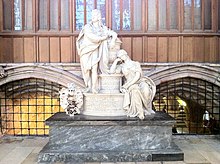Thomas Watson-Wentworth

Hon. Thomas Watson, later known as Thomas Watson-Wentworth (17 June 1665 – 6 October 1723), of Wentworth Woodhouse, Yorkshire, was an English landowner and politician who sat in the House of Commons between 1701 and 1723.
Early life
Wentworth was the third son of Edward Watson, 2nd Baron Rockingham and his wife Anne Wentworth, daughter of Thomas Wentworth, 1st Earl of Strafford. He matriculated at Christ Church, Oxford in 1683.[1] He married Alice Proby, a daughter of Sir Thomas Proby, 1st Baronet under licence dated 18 July 1689.[2]
In 1695, Watson inherited the fortune of William Wentworth, 2nd Earl of Strafford, including the Wentworth Woodhouse in Yorkshire, Northamptonshire, and Ireland, as the son of the second Earl of Strafford's sister Anne. This was in preference to the earl's nearer relative, Thomas Wentworth, and it led to a fierce rivalry between the two men and their families. In recognition of the bequest, Watson adopted the name of Wentworth, becoming Thomas Watson-Wentworth thereafter.[2]
Career
Watson-Wentworth was returned unopposed as Whig Member of Parliament for Bossiney at a by-election on 21 March 1701. He was only returned as a stop-gap and at the general election later that year he sought a seat elsewhere but in the end decided not to stand. At the 1702 general election, he stood at Higham Ferrers but was defeated. However his opponent died within a year and Watson-Wentworth was returned unopposed for Higham Ferrers at a by-election on 22 November 1703. He acquired the electoral interest at Higham Ferrers and was returned unopposed at the general elections of 1705, 1708 and 1710. He made little impression in his first parliaments, but being a church supporter moved progressively towards the Tories culminating in opposing the impeachment of Dr Sacheverell and being considered a worthy patriot. At the 1713 general election he was returned at Malton as well as Higham Ferrers and decided to sit for Malton. Now being considered whimsical or a Whig that voted with the Tories he supported the Whigs against the expulsion of Richard Steele and in other divisions.[2] After the 1715 general election, when he and his son were elected in a contest at Malton, he was classified as a Whig, but voted against the government on almost every occasion. At the 1722 general election he was returned unopposed again for Higham Ferrers.[3]
Death and legacy
Watson-Wentworth died at Harrowden on 6 October 1723 and was buried in York Minster where he has a monument.[2] His son was Thomas Watson-Wentworth, 1st Marquess of Rockingham, KB, PC (I) (13 November 1693 – 14 December 1750), a British peer and Whig politician who rebuilt the house at Wentworth-Woodhouse in 1725.
References
- ^ Foster, Joseph. "'Wasborow-Wesley', in Alumni Oxonienses 1500-1714, ed. Joseph Foster (Oxford, 1891), pp. 1577-1600". British History Online. Retrieved 17 November 2018.
- ^ a b c d "WENTWORTH, Hon. Thomas Watson (1665-1723), of Wentworth Woodhouse, Yorks. and Great Harrowden, Northants". History of Parliament Online (1690-1715). Retrieved 9 August 2018.
- ^ "WATSON WENTWORTH, Hon. Thomas (1665-1723), of Wentworth Woodhouse, Yorks". History of Parliament Online (1715-1754). Retrieved 10 January 2019.
